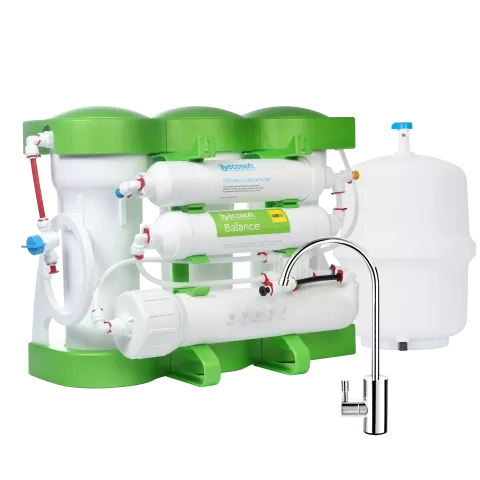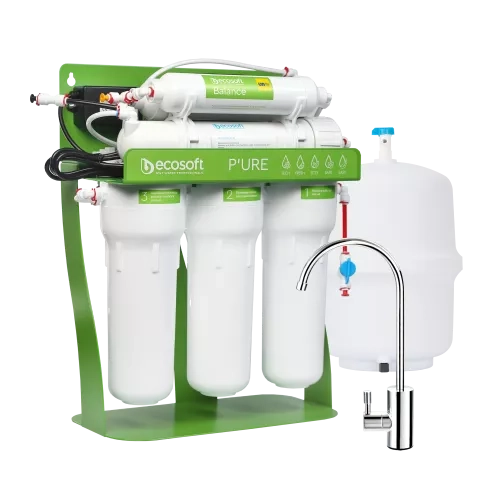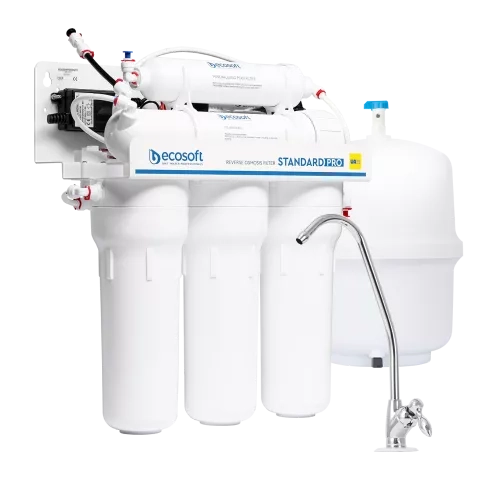Domestic Reverse Osmosis
Discover the excellence of our Domestic Reverse Osmosis Filters – the perfect solution for delicious and healthy water. Unique technology ensures the highest quality filtration, removing impurities and contaminants, while enriching water with essential minerals.
If you want to sell Domestic Reverse Osmosis filters with us, follow the link below.
Sub category
Flow rate
Recovery rate
Removes pollutants
Pagination
Welcome to our comprehensive guide on domestic RO water filters and water filtration systems for your home
In a world where having access to clean and safe drinking water is absolutely vital, think of domestic RO water filters as the unsung heroes that contribute significantly to the well-being of your family. Picture this guide as your friendly companion, guiding you through the significance of clean water, demystifying the technology that powers domestic reverse osmosis water filters, pointing out the key features and components that make them stand out, and highlighting their advantages. We'll also chat about how to pick the perfect filter for your needs, the nitty-gritty of water filter installation and maintenance, explore some alternative filtration options and toss in a handful of essential tips to help you conserve water and lead a more sustainable lifestyle.
What is a Domestic RO Water Filter?
Imagine a natural filter that lets only pure water through, blocking impurities. That's the reverse osmosis process (RO). Domestic RO water filters use this process to purify water, separating contaminants and ensuring cleaner, safer drinking water.
Domestic RO filters act as meticulous gatekeepers, employing multi-stage filtration with membranes and filters to remove impurities, chemicals, and pollutants. This process guarantees high-quality water for your household, promoting a refreshing taste and health protection.
When you bring a domestic reverse osmosis water filter into your home, you're not just getting a device; you're gaining a guardian for your family's water. This investment ensures that contaminants are filtered out, delivering water that tastes better and is safer to drink. Think of it as a protective shield against waterborne diseases, offering a reliable and cost-effective way to keep your loved ones supplied with a steady flow of clean and pure water. It's more than a machine; it's your family's defender, ensuring the water they consume is consistently pure and safe. At Ecosoft, we offer a range of domestic RO water filters and water filtration systems for home use.
Key Features and Components of Domestic RO Water Filters
Membrane quality and filtration capacity The quality of the membrane defines the filtration prowess of your RO filter, ensuring the efficient separation of impurities for a consistently pure water supply. | Sediment and carbon filters Frontline defenders, these filters tag-team to trap particles and adsorb chemicals, enhancing clarity and taste, promising a refreshing sip every time. | Storage tank and faucet options Balancing convenience and functionality, the storage tank guarantees a steady supply, while various faucet options provide flexibility in accessing your purified water. |
Monitoring and maintenance systems Think of these as your filter's personal assistants for water quality assessment. Monitoring systems keep you informed about performance, ensuring timely maintenance and filter replacements for an ever-efficient water purification process. | Mineralization Unique technology of mineralization, which enriches water with calcium and magnesium |
In a nutshell, these filter components and features collaborate seamlessly, turning your domestic RO filter into a reliable guardian, delivering not just water but a testament to technological excellence in water purification at home.
Advantages of Domestic RO Water Filters
- Removal of impurities and contaminants. Ensure your water is pure and pristine, as domestic RO filters efficiently eliminate impurities and contaminants, guaranteeing a clean drinking experience.
- Enhanced taste and odor elimination. Say goodbye to unpleasant aftertastes and odors. Domestic RO filters excel at enhancing the taste of your water, providing a refreshing and enjoyable drinking experience.
- Protection against waterborne diseases. Consider your RO filter as a robust shield. By eradicating harmful microorganisms, it is a reliable barrier, ensuring your family is protected against waterborne contaminants.
- Convenient and cost-effective water filtration. Experience the convenience of having a dedicated source of clean drinking water at home. Domestic RO water filters are not just practical; they also save you money by eliminating the need for frequent bottled water purchases. It's a smart and economical investment in your family's health and well-being.
- The unique AquaGreen technology of the Ecosoft company. AquaGreen technology saves the use of water by the filter and extends the life of the membrane.
Choosing the right water filter RO
Embarking on the journey to find the ideal domestic reverse osmosis system for your home is like choosing a reliable companion. Take a thoughtful approach by weighing factors such as water quality, filtration needs, and budget. Explore the diverse landscape of water filters models, comparing water filtration methods, unique features, and specifications. It's not just about finding a filter; it's about discovering the perfect match for your home and lifestyle and making sustainable water solutions.
Installation and Maintenance of Domestic RO Water Filters
Ensure a seamless experience with a step-by-step installation guide for domestic RO water filters. Most filters come with a step-by-step installation guide. Learn about regular filter maintenance and replacement, troubleshooting water filter issues, and exploring professional servicing options to keep your system operating at its best.
Other Water Filtration Systems for Domestic Use
Water filtration systems for homes do an excellent job of ensuring your water is pure. It's worth exploring other filtration methods like activated carbon filters, UV filters, and softeners. Each method has its strengths and weaknesses. Dive into the details, weigh the pros and cons of each system, and consider how they stack up against domestic RO filters. This way, you can make a choice that's not just informed, but perfectly aligned with what suits your unique needs. It's like finding the right tool for the job tailored to make your water purification experience just right for you.
Tips for Water Conservation and Sustainability
Recognize the value of water conservation tips, preserve this vital resource for the future, and open up all the benefits of domestic RO system for yourself. Cultivate habits like fixing leaks and using efficient appliances to minimize water waste in your daily life. Repurpose RO-reject water for non-potable needs, transforming waste into a valuable resource. Embrace eco-friendly choices such as reusable bottles and water filtration systems to reduce plastic waste and contribute to a healthier planet. Maintain not only your health, but also the health of the planet, and then you will be guaranteed a happy and enjoyable life.
Explore our range of domestic RO water filters and start your journey towards sustainable and healthy water solutions today.





